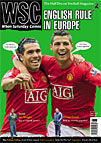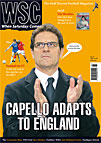What are the expectations for the team?
Generally lower than they should be given the quality of the players available. The Selecção had a bumpy ride in what looked at the outset to be a perfectly accessible qualifying group. Since then, in the warm-up games against Italy (13) and Greece (1-2), they were outclassed. Asked about the team’s chances, coach Luiz Felipe Scolari has been loath to commit himself: “There are 16 teams and we have the same 6.2 per cent chance as the others. After that, we’ll have a 12.4 per cent chance, and so on.” Cristiano Ronaldo is more confident: “We have every chance,” he told Spanish magazine Don Balón.
Are there any players who have appeared in TV commercials or other advertising?
As might be expected, Ronaldo is ubiquitous. One recent campaign for the bank BES has him floating wispily out of a football: “I am the Genie of the Ball and I grant you three wishes.” The supermarket chain Modelo, another official sponsor, has gathered players from five generations: a portly Eusébio, Fernando Chalana, Paulo Futre, Rui Costa and Ronaldo: “Live the dream of generations and support Portugal” (by, among other things, buying a scarf at the supermarket for €1).
Is the coach popular?
Opinion is split. Fans seem to be generally happy with him, especially since he’s overseen the most successful period in the Selecção’s history, and his urging people to hang Portugal flags out of their windows and get behind the team met with a good response in the last two tournaments. Most journalists, on the other hand, believe that he should have done even more with the players at his disposal. He is also disliked for his somewhat arrogant, prickly manner at press conferences. Portugal had just qualified with a nervous 0-0 draw against Finland at Porto’s Estádio do Dragão and, in a steadily escalating huff at some uncomfortable questions, he exploded with the now celebrated “I’m a donkey?! I’m a terrible coach?!” before storming out.
Which players are good interviewees and who are the worst?
Ricardo Quaresma is fascinating for his tics (including a trademark nose-scratch). Ricardo and Simão always look like they’ve just been told a great joke and will burst out laughing at any moment. As for what any of them say, it’s generally very non-committal stuff that toes the party line.
Are there any players with unusual hobbies or business interests?
Goalkeeper Ricardo keeps Doberman Pinschers. Midfielder Raúl Meireles has a set of tattoos that wouldn’t look out of place on Prison Break. Ronaldo and Quaresma apparently collect bling.
Do any of the players have famous girlfriends or wives?
The “pink press” makes sure that Cristiano Ronaldo’s girlfriends achieve immediate fame by association. He was with the B-list television presenter Merche Romero, eight years his senior, when he was in Portugal, and she’s still milking the reflected fame. On his arm at the time of writing is Spanish model Nereida Gallardo, who has apparently got as far as meeting the family.
Will there be any rehearsed goal celebrations?
If they make the cut, Nani will be doing his broken-neck-defying somersaults, while catwalk model and occasional footballer Miguel Veloso will be positioning himself strategically at the celebratory huddle to allow photographers to get the best shot of him.
Will any former players be involved in media coverage?
Among the pundits currently working for state channel RTP are Jorge Costa and Paulo Sousa, dour being the order of the day in both cases. Costa was sacked from his first coaching job at Sporting Braga this season because it appeared that he barely had a clue. Sousa’s contract with the Portugal Under-16 Selecção was not renewed last summer, presumably for the same reason.
What will the coverage be like ?
Portuguese TV commentators are notoriously low-key; even when a game is boiling with action and drama, tactics and statistics will be at the forefront. In contrast, radio coverage is always good for breathless enthusiasm and wacky “Goooooooooooooolo!” celebrations. In the press, one of the curiosities will be to see how many different reasons columnists, notably Miguel Sousa Tavares ( a diehard Porto-lover and Scolari-hater), can find to criticise the national coach.
Phil Town
 Johan Cruyff's latest revelation has only added to the idea that things are not always as they seem with the Dutch genius, says Derek Brookman
Johan Cruyff's latest revelation has only added to the idea that things are not always as they seem with the Dutch genius, says Derek Brookman 